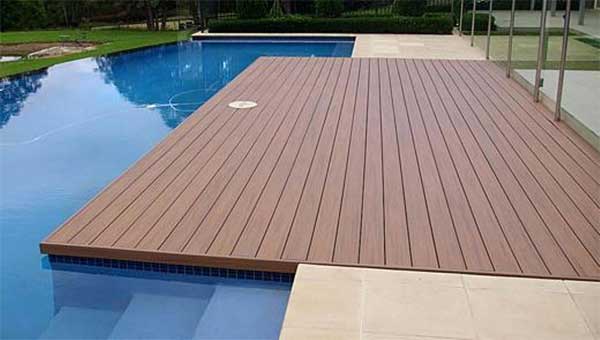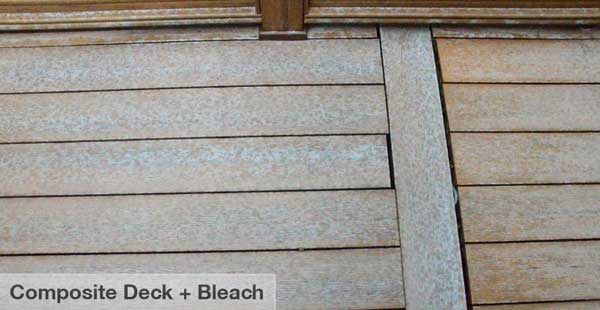How do you care for composite decking?
Water and oil stains, coffee and wine can all be removed from your composite decking surface in you act in time. Read more about how to maintain your deck.

Composite decking requires occasional hosing and a gentle scrub with soap and hot water twice a year.
Esthetically, composite decking resembles timber decking. Some of the composite decking materials and brands are so good at it that you cannot tell the difference between their product and the real decking timber before you come really close to it.
While it looks like decking timber, it isn’t as complicated as decking timber when it comes to maintenance. You need to scrub, wash, sometimes even sand, dry, and coat your timber decking. That is never the case with composite decking.
Ask for quotes for your composite decking project and compare them with the prices of timber decking. See if the maintenance is worth your while, or do you prefer to be free of that obligation and go for composite decking?
What Is Composite Decking?
Composite decking is an eco-friendly material that is used to replace timber decking in an effort to stop deforestation in Australia. It is a combination of wood and recycled plastic. These two components are pressed together and glued with different types of adhesives.

Image source: Specifier
Such material is then treated and coloured, and it looks just like the timber decking, minus the coating, sealing, maintenance and environmental impact.
Composite decking has a higher initial price, but it pays off in the long run since the maintenance costs are next to nothing.
How Do You Clean Composite Decking?
You don’t have to clean your composite decking every now and then. Of course, you should remove stains, scratches and obvious dirt right away, but you don’t have to worry about the annual coating or sealing. You can clean your composite decking twice a year and do it in the following steps:
- Start by using a leaf blower or a broom to remove dirt and debris.
- Use a hose, bucket or a can and soak the decking with hot water for 10 minutes.
- Add a bit of soap to the water
- Go over the surface of your decking with a soft broom.
- Hose down the water.
- Use a dry mop and squeegee to remove all the remaining water from your composite decking.
There are many things that can stain your composite decking. You should be aware that stains that come from oil, water, beverages, and tar can happen. Rubber, vinyl or latex rugs can leave marks on your composite decking surface.
Watermarks should be avoided as much as possible. They won’t happen if you simply drop a glass of water on the decking surface, but they will occur if there is water retaining somewhere on the deck. Wood from the decking soaks up the water, which is how the stain occurs.
Oil and grease stains are avoidable also. You simply need to act fast and wipe off all oil or grease that is in contact with the composite decking surface. Again, the guilty party is the wood. When the wood soaks up the oil, it is difficult to get rid of that stain. Hot water and detergent can remove oil successfully.
Coffee, wine, beer and soft drink stains just need to be removed quickly. As soon as they reach the surface of your composite decking, do your best to mop them away. If they are on the surface for too long, they need to be treated with special cleaning agents.
Tar stains are removed only by using specially designed solutions that can be used in hardware stores.
Can I Pressure Wash a Composite Decking?
Yes. You can pressure wash composite decking, but you have to make sure that your pressure washer is set to less than 2,500 psi. Also, don’t press the pressure wash onto your deck.
Make sure that there is at least 30 centimetres between your pressure washer and your decking when the water is on. That is the safe distance that ensures the decking will remain undamaged.
Just like with other instances when you need to wash your composite decking, it is important that you mop it and dry it thoroughly so that there is no water retaining. That is the only way to prevent the water stains from forming.
How Do You Remove Mould from Composite Decking?
If you live in an area in which mould and mildew are common, regularly inspect your composite decking so that you prevent a buildup. As soon as you notice brown or black spots, make sure that you soak the area with hot water and wash it away with soap.
Always make sure that there is no water residue because that is what the mould and mildew need to survive. Moist, in combination with dust, is what makes the perfect environment for mould. So, keep your composite decking dry and dust-free.
Another thing that you need to keep in mind is that proper ventilation is essential in preventing mould and mildew. That is why a foothold is necessary to ensure the airflow. That also helps with drying off your composite decking.
Can You Use Bleach to Clean Composite Decking?
It is not impossible, but it is strongly recommended that you do NOT use bleach for composite decking. Hot water and soap should do the trick for regular maintenance, but for more stubborn and persistent stains and dirt, there are specialised products that can help you clean your deck.

Image source: Ask Wet & Forget
While bleach will do nothing to kill your mould and mildew, it will also start to decompose the decking. Therefore, avoid it as it will do more damage than good.
Composite decking is among the most commonly used materials for decking these days. Decking installers recommend it, and they usually already have experience working with it. There is, of course, the matter of budget.
Ask for several quotes from decking experts before you start your project. In that way, you will be sure that you have paid a fair price and that you will get your job done.
There are lots of local decking installers who can provide you with top-notch services. Take a look at ServiceSeeking.com.au’s highest-rated decking specialists in these major cities:
Sydney | Melbourne | Brisbane | Perth | Adelaide | Hobart | Canberra | Darwin